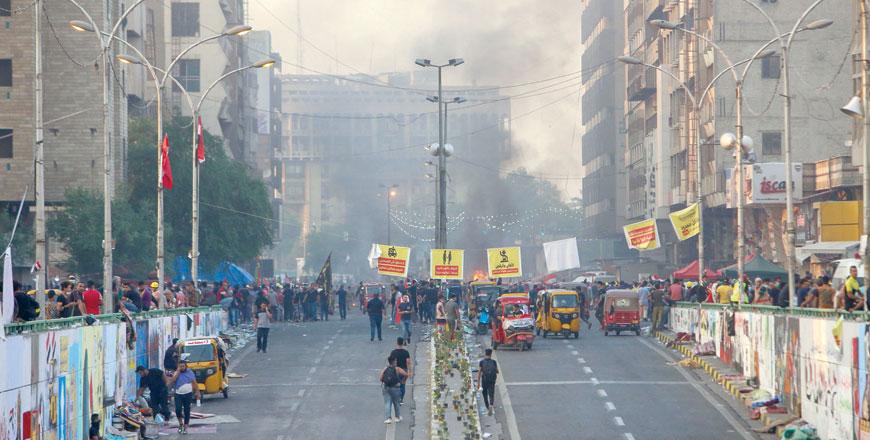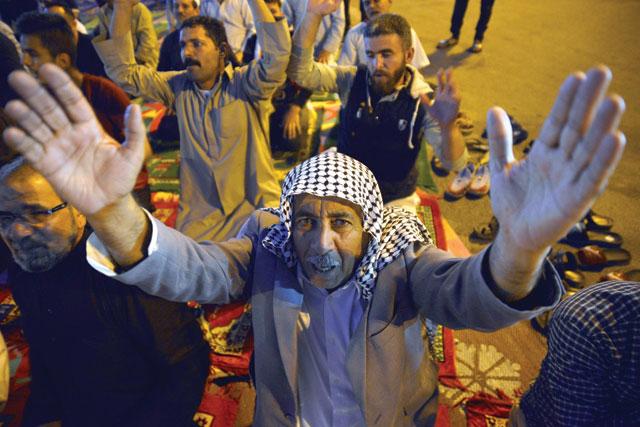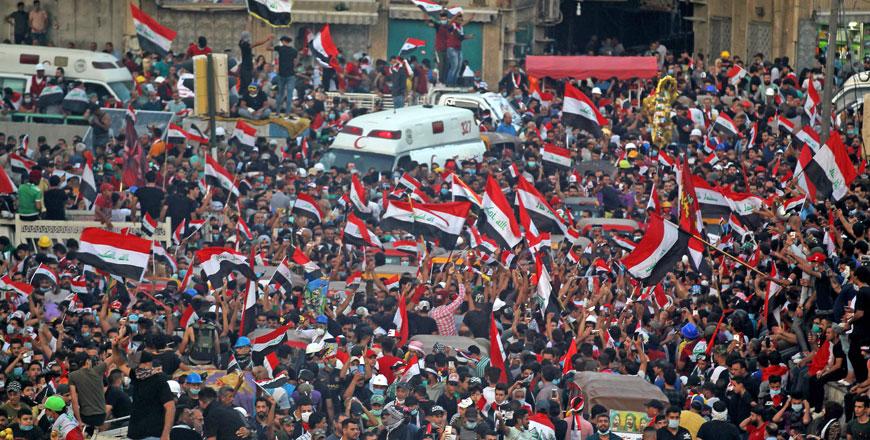You are here
Iraq forces clear protest sites as leaders reach deal to end rallies
By AFP - Nov 09,2019 - Last updated at Nov 09,2019

Iraqi demonstrators gather in Al Khalani Square in central Baghdad on Saturday, during clashes with Iraqi forces (AFP photo)
BAGHDAD — Iraqi forces fired live ammunition on Saturday as they pushed towards Baghdad's main anti-government protest camp, after political leaders agreed to stand by the Cabinet by any means — including force.
Gunfire and steady booms of stun grenades and tear gas rang out as security units approached Tahrir (Liberation) Square, ground zero for the month-long movement demanding regime change.
On Saturday afternoon, AFP correspondents saw people shot in the chest collapse to the pavement before being carried away by tuk-tuks.
"The security forces are getting closer to us, but the protesters are trying to hold them off by burning tyres," a doctor in Tahrir told AFP.
"We can hear live fire now and there are so many wounded."
Earlier, security forces wrested back control of three bridges over the River Tigris in the heart of Baghdad that had been partially occupied by protesters.
In Karbala, a revered Shiite holy city south of the capital, the tents of protesters were reduced to ashes when security forces fired searing hot tear gas canisters at them.
And in the southern city of Basra, security forces cleared a protest camp outside the provincial government headquarters.
Three people were killed and dozens wounded, according to medical sources, and security forces began rounding up demonstrators.
‘Any means possible’
The crackdown came after political chiefs agreed to rally around embattled Prime Minister Adel Abdel Mahdi, whose government was threatened by the largest and deadliest grassroots protests in Iraq in decades.
Abdel Mahdi, 77, came to power last year through a shaky alliance between populist cleric Moqtada Al Sadr and Hadi Al Ameri, a leader of the Hashed Al Shaabi paramilitary network.
When the protests erupted, Sadr threw his weight behind them while the Hashed backed the government.
But they closed rank around the premier this week after a series of meetings led by Maj. Gen. Qasem Soleimani, the head of the Iranian Revolutionary Guard foreign operations arm.
Soleimani, who often plays a mediating role during times of crisis in Iraq, met with Sadr and persuaded him to return to the fold, said a source present at the meetings.
“Those meetings resulted in an agreement that Abdel Mahdi would remain in office,” the source said.
Sadr has since gone silent amid reports he is in Iran.
Another source said political factions agreed this week to move forward on reforms and constitutional amendments if the premier and government stayed in place.
“They agreed to end the protests with any means possible and to reopen the bridges and shuttered streets,” said a senior member of one party represented at the gathering.
Abdel Mahdi met President Barham Saleh on Saturday for the first time in days. Government sources had told AFP ties between them had been cut after Saleh proposed the premier be replaced.
Parliament convened Saturday afternoon to discuss reform proposals, including hiring drives and increased welfare payouts.
Protesters despair
Meanwhile, the streets around Tahrir were in chaos.
“The security forces told us the protests are over and everyone should go home,” one protester shouted.
“But we put up more barricades so they won’t enter Tahrir. Tomorrow, no one goes to work,” he vowed.
Protesters are now on the backfoot but still occupy part of Al Jumhuriyah [Republic] Bridge, the southernmost of the capital’s bridges and the closest to Tahrir.
“Our situation as protesters is not good, but we’ll stay until we find a solution,” said another protester, his face wrapped in a black scarf with a white skull.
Public anger erupted last month over widespread corruption and a lack of jobs, then escalated into calls for the entire ruling system to be overturned.
Oil-rich Iraq is OPEC’s second biggest producer, but one in five people live in poverty and youth unemployment stands at 25 per cent, according to the World Bank.
It is ranked the 12th most corrupt country in the world, according to Transparency International.
An initial six-day wave of protests was met with brutal force that left at least 157 dead, according to an official probe, most of them protesters shot dead in Baghdad.
Since protests resumed on October 24, the deaths have nearly doubled to almost 300, according to toll compiled by AFP as the government has stopped issuing figures.
Related Articles
BAGHDAD — Iraqi anti-government protesters clashed with security forces and kept up their sit-ins Sunday, as a rights group warned a deadly
BAGHDAD — Iraq's anti-regime protesters gathered in the capital and south on Saturday, grieving but defiant after 17 were killed in an attac
BAGHDAD — Iraqi President Barham Saleh vowed Thursday to hold early parliamentary elections once a new law is passed and said the country's



















